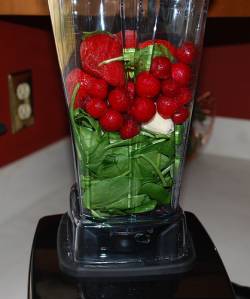 In an effort to limit my family’s exposure to BPA and phthalates, I’ve tossed all those freebie plastic water bottles and replaced them with aluminum Sigg bottles. I banned questionable toys. I store and heat my leftovers in glass containers. I took down our cheap plastic shower curtain and put up a fabric one. I even got rid of the rubber ducky.
In an effort to limit my family’s exposure to BPA and phthalates, I’ve tossed all those freebie plastic water bottles and replaced them with aluminum Sigg bottles. I banned questionable toys. I store and heat my leftovers in glass containers. I took down our cheap plastic shower curtain and put up a fabric one. I even got rid of the rubber ducky.
Frankly, I was feeling pretty pleased with myself.
Until I saw a post this weekend at ZRecommends which shares the results of their research into which brands of food processors and blenders contain BPA, PVC, and phthalates.
As a quick refresher: bisphenol-A, or BPA, and phthalates, plasticisers used to soften PVC, are components found in many common plastics. Studies have linked exposure to BPA and phthalates to hormonal issues such as early puberty and changes in breast tissue, as well as to some cancers.
And while I was well aware of their presence in toys, sippy cups, bottles, food storage containers, and a myriad of other places in the home, it really had never occurred to me that they might also be lurking within the devices I use for food preparation.
ZRecommends points out that some companies were not forthcoming about the possibility of their blenders and food processors containing BPA, PVC, or phthalates, and therefore they had to form their own educated conclusions about some products listed:
ZRecs Guide listings are flagged with Chemicals of Concern – substances that may be present in the products – along with a Confidence Rating denoting our level of confidence in that particular chemical profile. A Confidence Rating of “low” means that we do not have much faith that we have the whole story – a product might not contain the Chemical of Concern it has been flagged with, or might contain others; a Confidence Rating of “high” means that we are highly confident we know the whole story, and would be quite surprised to learn otherwise.
However, their food prep guide is quite comprehensive.
The winners: the Beaba Babycook, a multifunctional device for preparing homemade baby food; the Vita-Mix 5200 blender; and Hamilton Beach’s Big Mouth Food Processors. All are BPA, PVC, and phthalate free.
My KitchenAid appliances, while very pretty, are not on the winner’s list. In fact, both my blender and my food processor received the lowest ratings possible.
Check the food prep guide to see if your appliances contain any “ingredients of concern”.
Photo Credit: tiffanywashko under Creative Commons
Argh! I can’t win! I have a pro-series Cuisinart which we LOVE and heavily researched before getting it a few years ago… Never even thought about BPA being a factor. It’s got their lowest rating, but unfortunately they don’t give any details for this model, just that it’s a BPA risk from the plastic bowl.
We mainly use it just for chopping and slicing, which doesn’t involve heating or extended storage, so that’s probably not too bad. But I also use it for mixing and kneading bread doughs… I have to think about that. We should also probably stop washing it in the dishwasher, from what I understand the abrasion and heating from that is what can increase the risk of BPA leaching…
We have the original Waring blender which is glass so that’s good at least and I share the sadness about the cuisinart. The Kitchenaid mixer does wonders with bread dough if you have one of those…I also wanted to add that sigg aluminum bottles are lined with a coating that they refuse to disclose and many feel is not safe. I personally will not use any product that the manufacturer will not disclose the contents of and instead use kleen kanteen bottles.
Also aluminum in general is a bad idea because it is a toxic heavy metal that builds up in the brain (and has been found in high amounts in the brains of Alzheimer victims).
My Braun blender isn’t even listed, but it has a glass jar so hopefully it should be pretty low in problem chemicals.
I was glad to see that according to the site, our PUR brand filter pitcher is BPA, PVC, and phthalate free.
When you drop the plastic water bottles, that’s good. But don’t pick up the aluminum. Soft drink aluminum cans are the largest source of toxic aluminum in our environment, and aluminum toxicity has been linked to Alzheimer’s disease. Try for stainless steel.
The Vitamix may be BPA free, but how can it be phthalate free? It has a ‘polyester’ jug. Although Eastman Chemical refuse to disclose what Tritan copolyester is made of, Polyester is usually PET, the T stands for terephthalate. There is certainly documented evidence that it may not be as safe as you presume:
Unfortunately, BPA-free Tritan plastics were found to leach other (than BPA) estrogenic chemicals in a cell-based assay; Yang CZ, Yaniger SI, Jordan VC, Klein DJ, Bittner GD (2011). “Most plastic products release estrogenic chemicals: a potential health problem that can be solved”. Environ. Health Perspect. 119: 989–96. doi:10.1289/ehp.1003220. PMC 3222987. PMID 21367689.
I agree! The BPA-free plastics are just as bad.